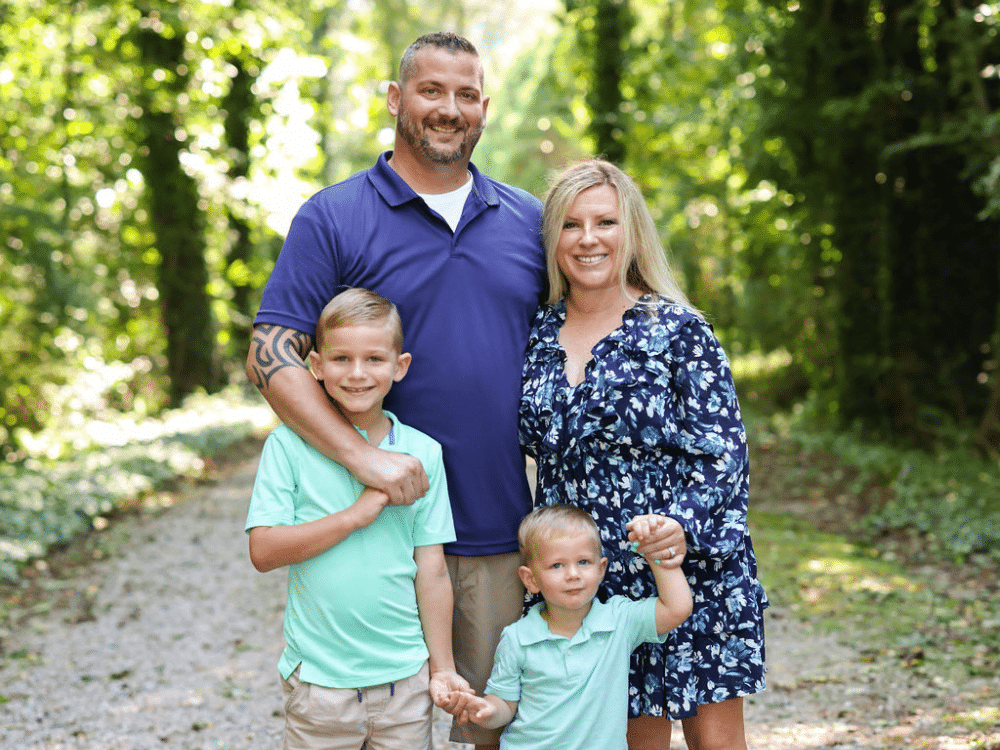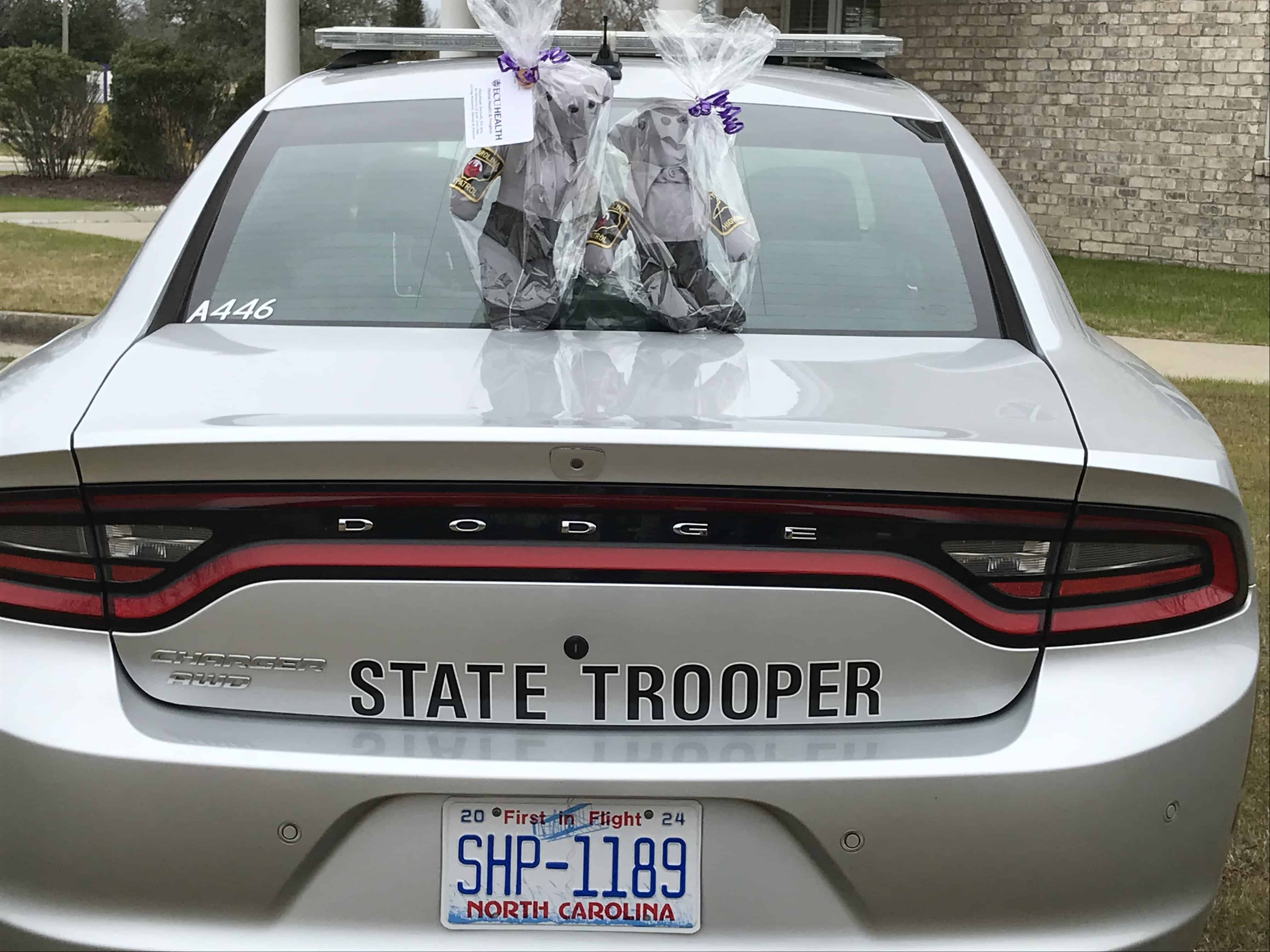Zach Martin served as a North Carolina state trooper, and after dealing with pain in his leg that began in August of 2022, he went to the doctor to find out what was going on. “The doctors did several rounds of steroid injections, but by December of 2022, he couldn’t walk and they did more tests,” said Ginny Martin, Zach’s wife. “It showed a large tumor in his left femur.”
Zach was diagnosed with Ewing sarcoma, a rare bone or soft tissue cancer that primarily affects children and young adults. Zach was 33 at the time of his diagnosis, and his cancer progressed rapidly. “You think someone our age shouldn’t get cancer,” Ginny said of Zach’s illness. “He had his whole career ahead of him. He should have watched our kids grow up. Sometimes life isn’t fair, but he gave it one heck of a fight.”
On Feb. 10, 2024, just after his 35th birthday, Zach Martin passed away at the Service League of Greenville Inpatient Hospice, an ECU Health hospice house with eight beds, private rooms, a health garden and a chapel/meditation room. “From the moment we walked in the door, they treated us like they’d treat their own family,” Ginny said.
A difficult road

Zach was a High Point, North Carolina native, and he and Ginny met when he moved to Belhaven to work in law enforcement. “Zach was a jokester, and he never met a stranger,” Ginny recalled. “He was always making people laugh.” They married in 2014 and had their first son, Greyson, in 2015. Their second son, Lawson, was born 6 years later.
After Zach’s surprising diagnosis, he began chemotherapy as soon as possible. Yet, his recovery wasn’t easy. At one point, he rolled over in bed and snapped his femur; he required surgery to replace 40 percent of the bone with a titanium rod. He was in the hospital for 10 days, and after returning home, he went through intense physical therapy from January to May of 2023. “He had to learn to walk again, and all during this time he was having chemo,” Ginny said. This was followed by radiation, during which time the family temporarily relocated to High Point so Zach’s family could help watch the boys. In August, Zach completed radiation, but later that month, scans showed the cancer was back and spreading rapidly. He began another type of chemotherapy, but he didn’t react well to it. “Between October and December, we were in the emergency department at least four times a month because of his pain,” Ginny shared.
Just before Christmas, Zach was in a great deal of pain, but no medication helped. He was admitted to the hospital on Jan. 2 in the hopes they could control his pain and to administer inpatient chemotherapy, but he again didn’t respond well to the treatment. “He had neurological toxicity, where he slept for days, didn’t eat or drink and didn’t know me or his mother or our kids,” Ginny said. “They started talking about hospice then, but thankfully he came out of it.”
Zach was able to go home on Jan. 20, but after a week at home, he was readmitted to the hospital for uncontrolled pain. “We knew at that point that his cancer was spreading like wildfire. He started having blurry vision, so we asked for a scan of his head and brain to be done, and the scan revealed that the cancer had spread to the lining of his brain. At that point, there was nothing they could do, and they suggested we discharge to hospice,” Ginny said.
Ginny said she knew there was the option to have in-home hospice, but she had been Zach’s caregiver for the past 18 months and she didn’t want her kids to see their dad so sick at home. “I told Zach I would rather we go to an inpatient hospice with nursing care 24/7 so I could be his wife for his remaining time.”
A home away from home
Zach was brought to the ECU Health inpatient hospice house via ambulance, accompanied by an escort of state troopers. “The first person I met when we arrived was the chaplain,” Ginny recalled. “And Dr. Clifton was his doctor. I can’t say enough great things about the hospice house.”
Marilyn Davis-Okubudike, the bereavement coordinator at the inpatient hospice house, recalled meeting Ginny for the first time. “I met her at the door, and when she came in, I had my arms out and hugged her,” Marilyn said. “I felt her need and the connection. There were others there for Zach, but I wanted her to know we were also there for her. I took a special interest in her and the children, as well as Zach’s mother.”
Marilyn said doing this sort of work is a calling, and not one that everyone can do. “It’s a beautiful service to take care of people. I feel rewarded by this experience because it’s all for the patients and their families. We’re called to care for each other.”
Dr. Margaret Clifton is the hospice medical director, and she also feels a close connection to the patients and families she serves. “It can be really emotionally challenging, but it’s meaningful work,” she said. “I enjoy getting to know the patients and their families. For me, there is a lot of meaning in making death a little less awful. If I can do that, I feel like I’m making the world a little softer.”
Ginny remembers Dr. Clifton – and all of the hospice staff – as being very supportive. “They listened and were nurturing through the whole thing,” she said. “If we didn’t understand something, they explained it. I got to bring the kids there, and his state trooper friends came to visit. The night he took his last breath, I came down the hall crying and Dr. Clifton was crying too. They all cried with us. One nurse came in on her day off just to be with us. You don’t find people like that – they are angels on earth.”
“Zach’s time at the hospice house will be something I carry around forever,” Dr. Clifton shared. “The thing that stands out is the community involvement. When he arrived here, he was escorted by the highway patrol. They shut down the road and there was a firetruck with a flag and highway patrol cars lining the ambulance bay. There were always officers here to visit, and they even brought his patrol car and parked it outside his room so he could see it. And when he died, they escorted his body to the funeral home in Washington, and there’s a picture of his oldest son with all of the highway patrol saluting Zach’s casket.”
After his passing, the Memory Bear program made bears not only for Zach’s boys, but also his mother, brother and sister. “They made the bears from his uniforms because I wanted the boys to have bears with the actual uniforms he wore,” Ginny said. “They were very accommodating as to what I wanted.” She also wanted a recording of Zach’s voice, but when they realized he was unable to speak, Dr. Clifton suggested they record his heartbeat instead. “Now it’s something sitting on the boys’ shelf that they can have forever, and they can press that bear and hear their dad’s heartbeat,” Ginny said.
While Zach and his family were at the inpatient hospice house for just six days, their experience was memorable. That’s because it’s like a home away from home, said Marilyn, a place where every team member works to meet the needs of the patients and their families. “A lot of people haven’t heard of us, but this is one of the best things ECU Health can offer the community and the 29 counties we serve. We need people to see what a beautiful jewel this place is.”
Resources
ECU Health Home Health & Hospice
